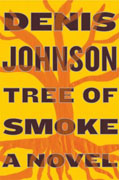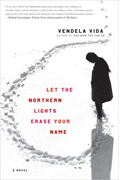
The Morning News Tournament of Books, sponsored by Powell’s Books, is an annual battle royale amongst the top novels in “literary fiction” published throughout the year. Read more about this year’s tournament »
» Buy the Books at Powells.com «
» Meet This Year’s Judges «
» Wager for Charity «
» Relive the Action: ’07, ’06, ’05 «
» Contact the Tournament Staff «
• ROUND TWO • MATCH ONE •
From the Booth
 |
Tree of Smokeby DENIS JOHNSON |

|
| v. | ||
Let the Northern Lights Erase Your Nameby VENDELA VIDA |
commentary by KEVIN GUILFOILE & JOHN WARNER
JOHN: I’m tempted to give Judge Sarvas the Dale Peck Pretentious A-Hole of the Tournament award for this review, but while the level of hubris here may be Peck-ish, it doesn’t manage to reach truly Peck-ian proportions and, in the end, despite his apparent pique at The Savage Detectives, a “once-in-a-generation” book, losing to the “slight” Let the Northern Lights Erase Your Name in an earlier round, he gave each of the remaining contenders a fair shot and made his best judgment.
On the other hand, managing to get the word “longueurs” into the mix (and using it correctly, no less), almost tipped the balance toward awarding him the trophy (a giant mirror with “You’re Awesome and Everyone Else Is Dumb,” stenciled across the top).
One of the things I enjoy most about the Tournament—and that I believe parallels the experiences of those following along at home—is what it causes me to realize about myself, my own tastes and predilections.
As the author of a hotly anticipated debut novel, Harry Revised, that’s been blurbed by the likes of John Banville, Sam Lipsyte, and Joshua Ferris, perhaps Sarvas has gained membership to a club that makes one feel comfortable calling the creative work of another writer “slight” (and maybe he’s referring to the page count, but I don’t think so), but for some reason, that word makes me cringe right down to my toes.
(Imagine one’s manhood being called, “attractive, but slight.”)
It’s possible, or maybe probable, that I’m being oversensitive since I really loved Let the Northern Lights Erase Your Name, and was rooting for Vendela Vida, but “slight” is about as cutting as it gets since it seems to negate any positive sentiments that may have come before it. Sarvas’s full use, “effective, if slight,” masquerades as praise, but I picture the line delivered with a wave of the hand, an offhand dismissal with a subtext of “feel free to spend your time doing that, but in the end, it doesn’t really matter, at least not next to a once-in-a-generation book.”
To be fair to Mark, I’m now going well beyond what I think is either his conscious or even subconscious intention, but the “slight” business in this case strikes me as vaguely sexist as well, as though a book about a young woman literally searching for her identity, no matter how skillfully it is rendered, could live up to the grand (at least judging by physical size) ambitions of either Bolaño’s or Johnson’s opuses.
I’ve said it before and I’ll say it again, when I finished Let the Northern Lights Erase Your Name, I had tears in my eyes and walked around in a daze afterwards. It’s a book where the author spent her time honing the story to its very essence, including nothing beyond what was necessary, which doesn’t feel slight to me at all.
KEVIN: For the record, as much as I enjoy being called a mischief-maker in my advancing age, Mark is kidding when he says we considered his request to nullify Elizabeth Kiem’s first-round decision. Our rejection of that idea was unanimous and swift. But there’s a lot of interesting stuff going on here, starting with Mark Sarvas—who obviously likes to pull the shirt over a writer’s head and give him the critical what-for when he thinks it’s warranted—reviewing a novel by Vendela Vida, who opened the first issue of The Believer with an essay by co-editor Heidi Julavits calling for everybody to keep their shirts on and the giving of less critical what-for. I think the Julavits essay has been unfairly characterized over the years (and probably again just now by me), but we definitely have a clash of philosophies here, which is compelling.
We also have a review by Mark Sarvas at a peculiar moment in time when he is about to make the complicated transition from critic to novelist. Well, it’s not always complicated (novelists review each other’s work all the time and they don’t always get spit in the face) but for the kind of critic into which Mark has fashioned himself over the past few years, it’s often difficult.
Mark has great passion for literature, and also great passion for criticism. But once a critic like Mark starts writing novels, his novels inevitably become not just literature but works of criticism themselves. Once you start telling people how not to write books, your own books become, perhaps unfairly, a response to the ones you didn’t like.
I’ve heard nothing but good things about Mark’s upcoming debut (full disclosure—we share an agent with exceptionally good taste). Harry, Revised received a starred review from Library Journal and fine early notices from elsewhere. That’s terrific, because writing novels is hard. Every novelist knows it’s difficult to write even a bad novel and nearly impossible to write a great one. But once a novel is set cautiously into the world on chicken legs, it doesn’t need to carry the additional burden of being some kind of statement on other people’s work.
You pointed out the terrific blurbs Mark received from John Banville and Sam Lipsyte and Joshua Ferris, great writers all. They are also writers whose work has been championed in the past by Mark Sarvas. I’m not suggesting there’s anything improper about this. Mutual admiration is a time-honored literary convention and it should go without saying that a writer would only solicit blurbs from other writers he respects. But what happens if Mark doesn’t like the next novel by one of these authors? Since his silence on a Banville novel in particular would be deafening, his choices would be to compromise his integrity or be a total asshole. Because if I gave a glowing blurb to a first-time novelist and he subsequently trashed me on his web site (or in The Dallas Morning News), that’s the word I’d use in the email.
My only point is that the relationship between critics and novelists is pretty straightforward. The relationship between novelists and other novelists, while frequently whiskey-scented and fun, is more complicated. The relationship between the critic-novelist and other novelists is screwed up three ways from next Thursday.
A good critic has high expectations for every book he reads. A good novelist is usually a writer whose books exceed his relatively modest ambitions. It’s tough to be both those guys. Mark certainly doesn’t have a target on his back anywhere near the size of Dale Peck’s. Nevertheless Peck’s novels, while generally well regarded on their own, couldn’t anywhere meet the standard to which he held other writers, and both his criticism and his fiction were eventually diminished.
I’m not telling Mark anything he doesn’t already know. I’m sure he’s thought about it a lot more than I have. And he does have potential consolation in the upcoming Zombie Round.
Maybe Bolaño will pull off a dramatic resurrection.
JOHN: Of course, one of Mark’s heroes, James Wood, is a critic/novelist who released a pretty highly regarded novel a few years back and continues to deliver sharp and thoughtful criticism that I often disagree with but can’t ignore. I think what I object to, probably as part of my very nature, is the certainty with which James Wood makes his pronouncements about what novels should and should not do and be.
Wood’s next book, already released in the U.K. and coming out here this summer is titled How Fiction Works and is described as “nothing less than a philosophy of the novel.” Now, James Wood has a few years and about 60 IQ points on me, but I can’t imagine attempting such a thing, let alone releasing it for public consumption.
I’m being a little flippant, but not entirely. Perhaps I am just reflexively anti-certainty and James Wood and Mark Sarvas sound nothing but certain in their writings on literature. My hunch and my hope is that Wood and Sarvas contain considerably more doubt about these things than comes across in their criticism. I think what I object to mostly is that there is an implicit or explicit desire to contain and codify something that always will and always must resist taming. To the extent that criticism is the opening to a conversation, I drink it like an Old Style king can in the Wrigley Field bleachers. But if we manage to shove fiction into a particular box, what good is it, really?
Believe it or not, people, (and most won’t, if they’ve been reading these commentaries), I teach creative writing to college undergraduates for a significant chunk of my living. I try to instill them with tangible and concrete knowledge of issues of craft, but when it comes to those things that really makes fiction go, I’m forced to shrug my shoulders and say, “I don’t know,” because the second I think I have a handle on it, a hundred counter-examples pop into my head and leave the theory more shredded than the Bear Stearns investment portfolio of the last 12 months. My personal version of How Fiction Works would be the world’s shortest book of criticism: “Magic.”

» DOWNLOAD THE BRACKETS «
• Round One •
Tree of Smoke v. Ovenman
judged by Tobias Seamon
The Savage Detectives v. Let the Northern Lights Erase Your Name
judged by Elizabeth Kiem
Then We Came to the End v. Petropolis
judged by Anthony Doerr
You Don’t Love Me Yet v. New England White
judged by Jessica Francis Kane
Run v. Shining at the Bottom of the Sea
judged by Kate Schlegel
What the Dead Know v. The Brief Wondrous Life of Oscar Wao
judged by Elizabeth McCracken
On Chesil Beach v. Remainder
judged by Ze Frank
The Shadow Catcher v. An Arsonist’s Guide to Writers’ Homes in New England
judged by Helen DeWitt
• Round Two •
Tree of Smoke v. Let the Northern Lights Erase Your Name
judged by Mark Sarvas
Then We Came to the End v. You Don’t Love Me Yet
judged by Maud Newton
Shining at the Bottom of the Sea v. The Brief Wondrous Life of Oscar Wao
judged by Ted Genoways
Remainder v. The Shadow Catcher
judged by Mark Liberman
• SEMIFINALS •
Tree of Smoke v. Then We Came to the End
judged by Gary Shteyngart
The Brief Wondrous Life of Oscar Wao v. The Shadow Catcher
judged by Nick Hornby
• ZOMBIE ROUND •
Then We Came to the End v. Remainder
judged by Rosecrans Baldwin
The Brief Wondrous Life of Oscar Wao v. The Savage Detectives
judged by Andrew Womack
• FINAL ROUND •
Remainder v. The Brief Wondrous Life of Oscar Wao
All Judges + Jennifer Szalai